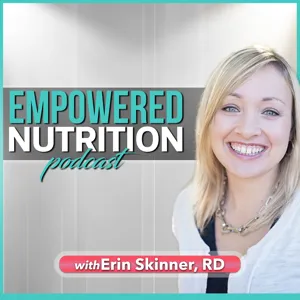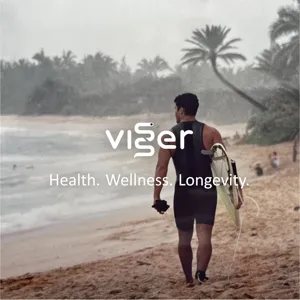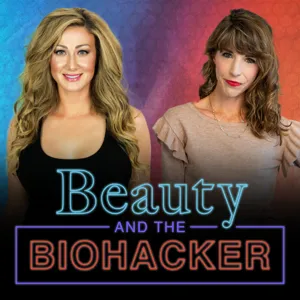Podcast Summary
Tim Spector: A Multidisciplinary Journey into Nutrition and Gut Health: Tim Spector, an epidemiologist with a unique background in medicine, rheumatology, and genetics, is driven by a passion for debunking myths and uncovering the truth behind nutrition and gut health.
Tim Spector's career and academic background is a unique combination of various specialties and interests. He started in medical school and specialized in rheumatology, but his curiosity led him to explore epidemiology and the study of risk factors in populations. His fascination with the differences in identical twins and the discovery of different gut microbes in twins propelled him into the field of nutrition and gut health. Tim's personal drive stems from his passion for debunking myths and uncovering truth, like a detective. Furthermore, significant events in his life, such as the sudden death of his father at a young age, have motivated him to make the most of his life and delve deeper into the study of genetics. Overall, Tim's diverse background and personal experiences have shaped him into an epidemiologist specializing in nutrition and gut health, aiming to change the way people think about food.
The vital role and impact of the microbiome on our health and well-being: The microbiome, consisting of thousands of different species of gut microbes, produces crucial chemicals that affect our immune system, brain function, appetite regulation, and overall health. Understanding the microbiome challenges traditional beliefs about food and emphasizes the importance of diet for gut health.
The microbiome, which refers to the community of gut microbes in our intestines, plays a crucial role in our overall health and well-being. These microscopic bugs, consisting of thousands of different species, act as a pharmacy within our bodies, constantly producing vital chemicals that are essential for our immune system, brain function, appetite regulation, vitamin synthesis, and neurochemical balance. The microbiome can influence our susceptibility to aging, cancer, infections, allergies, and even mental health conditions like depression. Understanding the significance of the microbiome challenges the traditional belief that food is solely a source of calories and macronutrients, emphasizing the need to consider the impact of diet on gut health. This insight is particularly evident in the differences between identical twins, where variations in their gut microbes can explain disparities in their health outcomes.
Debunking Gut Health Myths: Consuming probiotics from fermented foods and avoiding ultra-processed foods and antibiotics is crucial for a healthy gut microbiome. Calorie counting is not a sustainable weight loss strategy.
There are several common myths and misconceptions about maintaining a healthy gut. One of these myths is that probiotics in yogurt are ineffective because they get killed by stomach acid. However, while some probiotics do get killed, enough survive to have a beneficial effect. It is also important to note that the best probiotics are found in food, particularly fermented foods. Additionally, many people believe that most gut microbes are harmful, but in reality, the majority of them are actually trying to help us. To improve the health of our gut microbiome, it is recommended to consume a diverse range of plants, including nuts, seeds, herbs, spices, and fermented foods. Avoiding ultra-processed foods and antibiotics is also beneficial. Furthermore, calorie counting is not an effective long-term strategy for weight loss and maintaining a healthy weight. The body's evolutionary mechanisms make us hungry and slow down our metabolism when we restrict calories, leading to a rebound effect and potential weight gain.
The Ineffectiveness of Calorie Counting for Weight and Health Management: Calorie counting is unreliable and ineffective due to varying metabolisms and the different effects of calories on the body. Instead, prioritize the quality of food for better health and weight management.
Calorie counting is not an accurate way to manage weight and health. Professionals find it difficult to count calories accurately, and even calorie counts on packaging can be unreliable. Everyone's metabolism is different, so a one-size-fits-all approach to calorie counting is ineffective. Furthermore, not all calories have the same effect on the body. Ultra processed foods can cause people to consume more calories and feel hungrier, possibly due to the chemicals in these foods affecting gut microbes and absorption rates. Additionally, factors such as sugar spikes can lead to overeating and tiredness. Instead of obsessing over calories, it is more important to focus on the quality of food, which refers to whole, minimally processed foods that provide essential nutrients from plants and other sources.
The importance of natural foods and caution with ultra-processed options: Natural foods like nuts, seeds, grains, fruits, and vegetables retain essential nutrients, while ultra-processed foods with excessive packaging and advertising may not be healthy choices. It's important to be aware of marketing tactics and be cautious of misleading labels.
The quality of food can be determined by its original form and the absence of excessive processing and additives. Tim Spector emphasizes that natural foods, such as nuts, seeds, grains, fruits, and vegetables, are healthier choices because they retain essential nutrients. On the contrary, ultra-processed foods with excessive packaging, advertising, and ingredient lists should be approached with caution. Food labels indicating "low calorie," "low fat," or boasting added vitamins may not necessarily signify a healthy option, as they often contain artificial sweeteners or poor-quality additives. When navigating the supermarket aisles, choosing unpackaged, minimally processed foods like vegetables is generally a reliable indicator of quality. However, it is important to be aware of the marketing tactics that have led to misconceptions about what constitutes healthy food.
Personalized Nutrition and the Power of Time-Restricted Eating: Understanding our individual nutritional needs and implementing time-restricted eating can lead to improved overall health, mood, energy, and hunger levels.
Personalized nutrition is essential in understanding what works best for our bodies. While there are general rules about healthy eating, individual differences play a significant role in how our bodies respond to certain foods. It's not as simple as following one-size-fits-all guidelines, as what works for one person may not work for another. This is where experimentation and self-awareness come into play. Additionally, intermittent fasting, specifically time-restricted eating, has gained popularity for its potential benefits in metabolism, weight loss, inflammation levels, and energy management. By restricting our eating window to around 10 hours a day, we can give our bodies the recovery time they need and potentially see improvements in mood, energy, and hunger levels.
The benefits of time-restricted eating for our microbiome, weight loss, energy levels, mood, and sleep quality, and the importance of personalization and a well-rounded diet.: Time-restricted eating can help improve various aspects of our health, but it is important to personalize the approach and maintain a balanced diet with plenty of plant-based foods.
Time-restricted eating can have significant benefits for our microbiome, weight loss, energy levels, mood, and even sleep quality. By giving our gut a break for at least 14 hours, we allow other microbes to act as a repair team, cleaning up our gut wall and reducing inflammation. However, it's important to personalize this approach as it may not be suitable for everyone. Some individuals find it challenging to go long periods without eating, while others prefer eating earlier in the day or skipping breakfast. Additionally, relying on vitamins and supplements is not necessary for those with a well-rounded diet that includes plenty of plants. These findings emphasize the need for individualized approaches to diet and lifestyle choices.
The Truth About Vitamins and Supplements, and the Importance of a Balanced Diet: Relying on vitamins and supplements alone is not beneficial for overall health. Instead, focus on a balanced diet and prioritize real, unprocessed foods for optimal well-being.
Taking vitamins and supplements may not have the promised health benefits and can even be harmful. Many supplements are not effectively absorbed by the body and can lead to negative effects like heart disease. It is important to rely on a balanced diet and proper nutrition rather than relying solely on pills. Taking supplements can create a false sense of being healthy while neglecting proper food choices. Additionally, the ketogenic diet can lead to positive health outcomes, but it's crucial to focus on eating real, unprocessed foods and making a shift towards a healthier diet overall. Properly cooked, home-prepared meals are far better than relying on takeaways and ultra-processed foods.
The drawbacks of the keto diet and a sustainable alternative: Shifting to a balanced and diverse diet, including fermented foods and polyphenol-rich options, can provide similar benefits to the keto diet without its negative effects on gut health. Focus on sustainable choices for overall well-being.
While the keto diet may have short-term benefits for people with diabetes and weight issues, it is not sustainable in the long run and can have negative effects on gut health. Tim Spector suggests that shifting to a more balanced and diverse diet is a better approach. By incorporating fermented foods, a variety of plants, and foods rich in polyphenols, individuals can achieve similar benefits without the extreme restrictions of the keto diet. This "gut-friendly" diet not only helps control fat levels and reduce refined carb intake but also promotes a healthy gut microbiome and dampens inflammation. The focus should be on sustainable choices that can be maintained in the long term for overall well-being.
The Impact of Food Choices on Health: Dark Chocolate, Coffee, and a Holistic Approach: Be mindful of your food choices by opting for dark chocolate over milk chocolate, consuming coffee in moderation, and prioritizing a holistic diet that supports the health of your gut microbes.
Our food choices can have a significant impact on our health. Tim Spector emphasizes the importance of consuming dark chocolate instead of milk chocolate, as it contains less sugar and offers more health benefits. He also discusses the varying effects of coffee, highlighting that while it can be beneficial in optimal doses, excessive consumption can have negative consequences. Spector encourages a shift away from reductionist thinking and acknowledges the complexity of food, noting the numerous ingredients and compounds that contribute to its overall impact on our well-being. He suggests paying attention to the color and variety of fruits and vegetables, as these choices often contain higher levels of beneficial compounds. Taking a holistic approach to our diet, particularly by prioritizing the health of our gut microbes, can lead to a healthier lifestyle.
Considering the Whole Picture in Epidemiology Research: When interpreting research findings, it is important to look at the overall body of evidence rather than individual studies, and be critical of popular beliefs such as gluten intolerance or weight loss being solely reliant on exercise.
In the field of epidemiology, coffee consumption has been linked to various outcomes, both positive and negative, but it's important to consider the overall body of research rather than relying on individual studies. While some studies suggest a link between coffee and improved mood, others caution against excessive consumption. It's crucial for individuals to be selective and critical when interpreting research findings, especially after the COVID-19 pandemic. Additionally, the perception of gluten intolerance may be overblown, as studies show that many individuals who believe they are gluten intolerant actually test negative for it. Cutting out gluten may not always be the solution, and it's essential to examine other factors such as overall dietary habits and food diversity. Finally, weight loss is not solely dependent on exercise, as other factors like diet and individual variations influence outcomes.
The Role of Exercise and Sugar in Weight Loss: While exercise alone does not significantly contribute to weight loss, changing one's diet is essential. Additionally, the belief that sugar is the sole culprit for weight gain is reductionism, as exercise also plays a role.
Exercise alone does not significantly contribute to weight loss. Numerous studies have shown that exercise has very little impact on weight loss and that the idea of exercise as the main solution to obesity is an over-exaggeration. Changing one's diet is essential for effective weight loss, and maintaining exercise can help prevent weight from increasing again. The belief that sugar is the sole culprit for weight gain is reductionism, as exercise also plays a role. However, the lack of research on the relationship between sugar and weight compared to exercise and weight can be attributed to the influence of government and food companies. Moreover, switching to diet versions of sugary drinks may not have the desired weight loss effect, as the artificial sweeteners can alter the brain's preference for sweetness.
The harmful effects of artificial sweeteners and the importance of a healthy gut microbiome.: Artificial sweeteners can negatively impact gut microbes, leading to spikes in blood sugar levels. Funding from sugar and processed food companies has skewed research on weight management, neglecting the effects on gut health. Maintaining a healthy microbiome is crucial for overall well-being.
Artificial sweeteners, including so-called "healthy" ones like stevia, have a negative impact on gut microbes and can even cause spikes in blood sugar levels. These sweeteners are not inert and may have harmful effects on our health. It is suggested that the sugar and processed food conglomerates have been funding research and promoting the idea that calories in, calories out is the only important factor for weight management. However, there is a lack of rigorous testing on how these chemicals affect our gut microbiome. Additionally, the quality of our gut microbes is intricately linked to our mood, with studies showing that depressed or anxious individuals often have abnormal microbiomes. This highlights the importance of maintaining a healthy microbiome for overall well-being.
Improve Your Mood and Health with a Mediterranean Diet: A Mediterranean gut-friendly diet can be a powerful tool in improving mood, reducing symptoms of anxiety and depression, and positively impacting other conditions such as ADHD. Taking control of your health starts with focusing on personalized nutrition.
Feeding your gut with a Mediterranean gut-friendly diet can improve your mood and potentially lead to more remission than antidepressant medication. This is particularly important in addressing the epidemic of anxiety and depression. The gut microbiome also plays a role in other conditions, such as ADHD, and improving diet may have a positive impact on symptoms. While mental health disorders have multiple factors involved, including genetics and environmental triggers, poor gut health and diets high in ultra-processed foods can lower the threshold for these conditions in susceptible individuals. By focusing on improving gut health through personalized nutrition, individuals can take control of their own health. This is the underlying mission of Zoe.
The Power of Personalized Nutrition: Zoe's data-driven approach to personalized nutrition, based on an individual's unique profiles, helps people make healthier choices and improve overall well-being, without relying on generic diets or calorie counting.
Personalized nutrition is the future of healthy eating. Tim Spector explains how his company, Zoe, uses data from a massive study called the predict study to create personalized scores for individuals based on their glucose, blood sugar, fat, and microbiome profiles. This information helps people understand how different foods affect their bodies and guides them towards making healthier choices. Zoe's approach focuses on improving overall well-being from the inside out, rather than just counting calories or promoting crash diets. The success and demand for Zoe's products and services demonstrate the growing interest in personalized health and the recognition that there isn't a one-size-fits-all diet. This personalized approach to nutrition is a game-changer and is gaining attention at the right time.
Personalization, Sustainability, and Enjoyment: Key Aspects of Healthy Eating: Taking control through apps, making informed decisions, and focusing on long-term changes are important for a healthy diet. Balance indulgences with nutritious foods and embrace food enjoyment, variety, and cultural aspects for overall well-being.
Personalization, sustainability, and enjoyment are crucial for maintaining a healthy way of eating. Tim Spector emphasizes the importance of giving people control through apps and empowering them to make informed decisions about their diet. He also highlights the need to focus on long-term changes rather than quick fixes. Spector suggests that nothing should be completely banned from one's diet, including treats like white chocolate, as long as they are seen as occasional indulgences. It's about finding a balance and making up for less healthy choices with a majority of nutritious foods. Additionally, Spector encourages taking pleasure in food, broadening the range of foods consumed, and recognizing the social and cultural aspects of eating. By adopting a sustainable and personalized approach to nutrition, individuals can improve their overall health and well-being.
The Importance of Meaningful Communication in Relationships: It is important to prioritize open and honest communication with loved ones, as it is a shared responsibility and can prevent regret in the future.
The opportunity to communicate and connect with loved ones shouldn't be taken for granted. Tim Spector expresses his regret for not being able to have meaningful conversations with his late father and feels a sense of responsibility for not doing so. He acknowledges that it's common for children to perceive a strained relationship with their fathers and feel at fault. However, Steven Bartlett reminds us that communication is a two-way street, and it is also the responsibility of the parent to foster a bond with their child. The conversation highlights the importance of open and honest dialogue between family members, as well as the significance of expressing emotions and sharing thoughts before it's too late.





